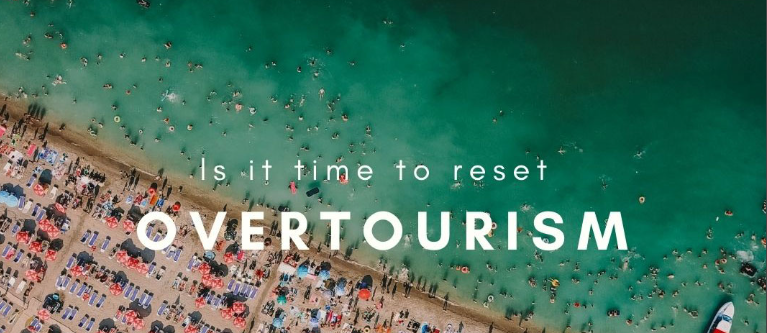Overtourism has emerged as a critical issue affecting cities worldwide as destinations become increasingly overrun with visitors, leading to a range of negative impacts on local communities, infrastructure, and the environment. This report aims to explore the phenomenon of overtourism and its detrimental effects on cities, analyze key contributing factors and propose potential solutions to address this pressing issue.
If you want to plan a tour of London, Agra, or New York, etc., then beware; the world is overrun with tourists. These cities have a golden era for tourists, but these cities are tired of tourists because of overtourism. This happened after COVID and people took revenge. This type of travel is called “revenge travel.”
Some question were asked
1. When does tourism become overtourism?
2. Why should it care?
when the number of tourists is greater than the capacity of the tourists in those cities or places, this is called overtourism. it should be cared for because it has a social impact in that places and also causes ecological damage, etc.
The main reason for increasing tourism is social media and their posts, like # (name of place). Due to this, tourism has boomed. through this one gem, destinations become overpopulation destinations.
Also read-Exploring Ayurvedic Approaches To Dysmenorrhea Treatment

Overtourism
The Phenomenon was that certain place of interest are visited by excessive number of tourists, causing undesirable effects for the places visited

Some reports on overtourism
By UNWTO
International tourists are expected to hit 1.8 billion by 2030
what does overtourism lead to?
- damage to heritage sites
- cultural disruption
- bad experience for visitors
- long traffic jams
- over priced food
- endless queae
- doesn’t sound like holiday
- no places to just take a breath

What causes overtourism?
- Growing population
- Growing Affluence
- Greater Accessibility
Some examples of overtourism that the government
- Venice is the poster child of overtourism; it can have bumper-to-bumper rush-hour traffic.
- venice gets an estimated 30 million visitors every year.
- The delicate veneration ecosystem can’t handle it.
As result of these
The floating city is losing its essence.
What does the government do here?
The Venice entry fee will start this year. starting in spring 2024, visitors to the floating city will have to pay 5 euros to enter. on peak days if they are not staying the night.

By the business insider
- Greece is to cap Acropolis tourists at 20,000 a day amid increasing European overtourism.
- Amsterdam bans cruise ships to control tourism and pollution.
- Italy Portofino has introduced ‘no waiting zones to stop tourists from posing for selfies.
- Spain imposes a new tourist tax.
- Bali’s new set of rules for tourists to dress appropriately.

Indian tourism
- Tourism in India is a $194 billion market.
- It contributes to 6.8% of the GDP
- It affects roughly 40 million people in terms of their income.
- It is very important for India but all of this comes at a cost.

Effects of overtourism in India
- Joshi Math was once a busy tourist spot. It has a negative impact on their natural behavior. Loss and damage to the Himalyan Mountains by the vibration of vehicles and overtourism, making too many homes and damaging the ecosystem.
- Overtourism often promotes equality
- Tourists drive up prices in many cities and locals face this problem.

So, what do we do to curb overtourism?
- Do we just stop traveling? No, travelling is not wrong. but we start taking responsibility.
- Value experiences over checklists.
- Support local businesses.
- Respect local customs.
Overtourism causes a global crisis. It needs global awareness and global action. It is a wake-up call for the world.

Solutions of the overtourism problem
- Destination Management Strategies: Cities need to develop comprehensive destination management plans that focus on sustainable tourism practices, including carrying capacity assessments, zoning regulations, and diversification of tourist attractions to alleviate pressure on overcrowded areas.
- Community Engagement: Involving local residents in decision-making processes and tourism planning can help foster a sense of ownership and ensure that tourism development aligns with the needs and values of the community.
- Regulatory Measures: Implementing regulations such as tourist quotas, congestion pricing, and taxes on short-term rentals can help mitigate the negative impacts of overtourism while generating revenue for local infrastructure and conservation efforts.
- Promotion of Responsible Tourism: Encouraging tourists to practice responsible travel behavior, such as respecting local customs and minimizing their environmental footprint, can help mitigate the adverse effects of overtourism on cities.

Conclusion
Overtourism poses significant challenges to cities worldwide, threatening the sustainability of tourism destinations and the well-being of local communities. Addressing this complex issue requires a multi-faceted approach that balances the economic benefits of tourism with the need for environmental conservation and social equity. By implementing strategic planning, community engagement, and regulatory measures, cities can work towards achieving a more sustainable and resilient tourism industry that benefits both residents and visitors alike.
Also read–Unveiling The Hidden Risks: The Impact Of Consuming Ultra Processed Foods On Health
images source: Google
Disclaimer: The opinions and suggestions expressed in this article are solely those of the individual analysts. These are not the opinions of HNN.




































